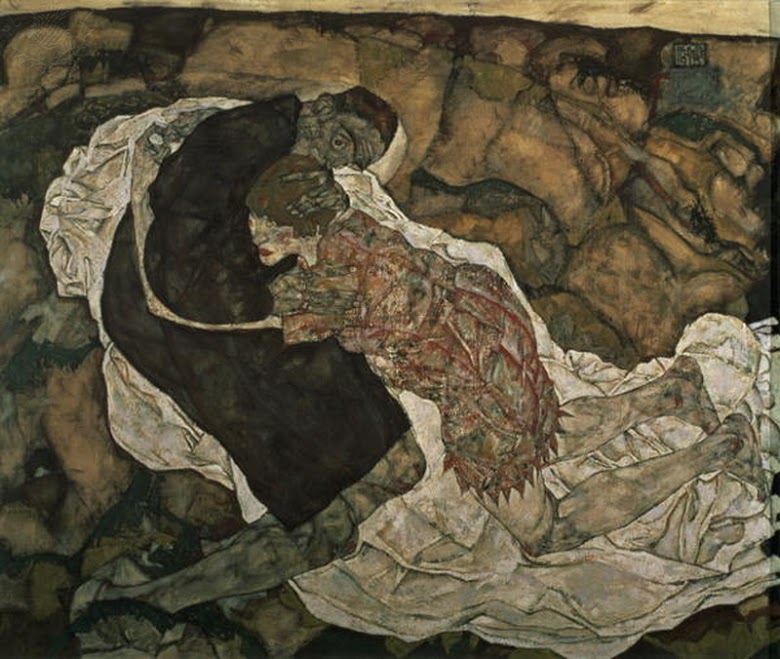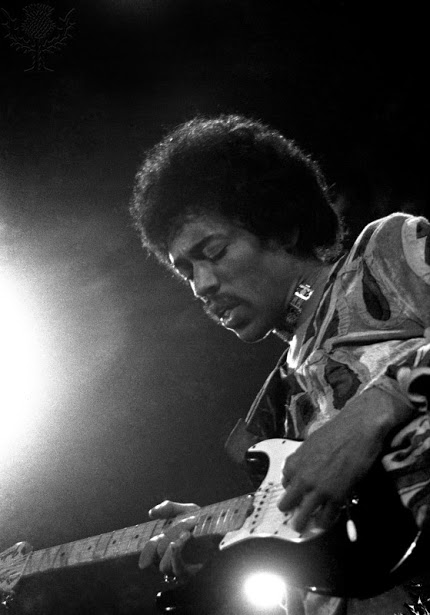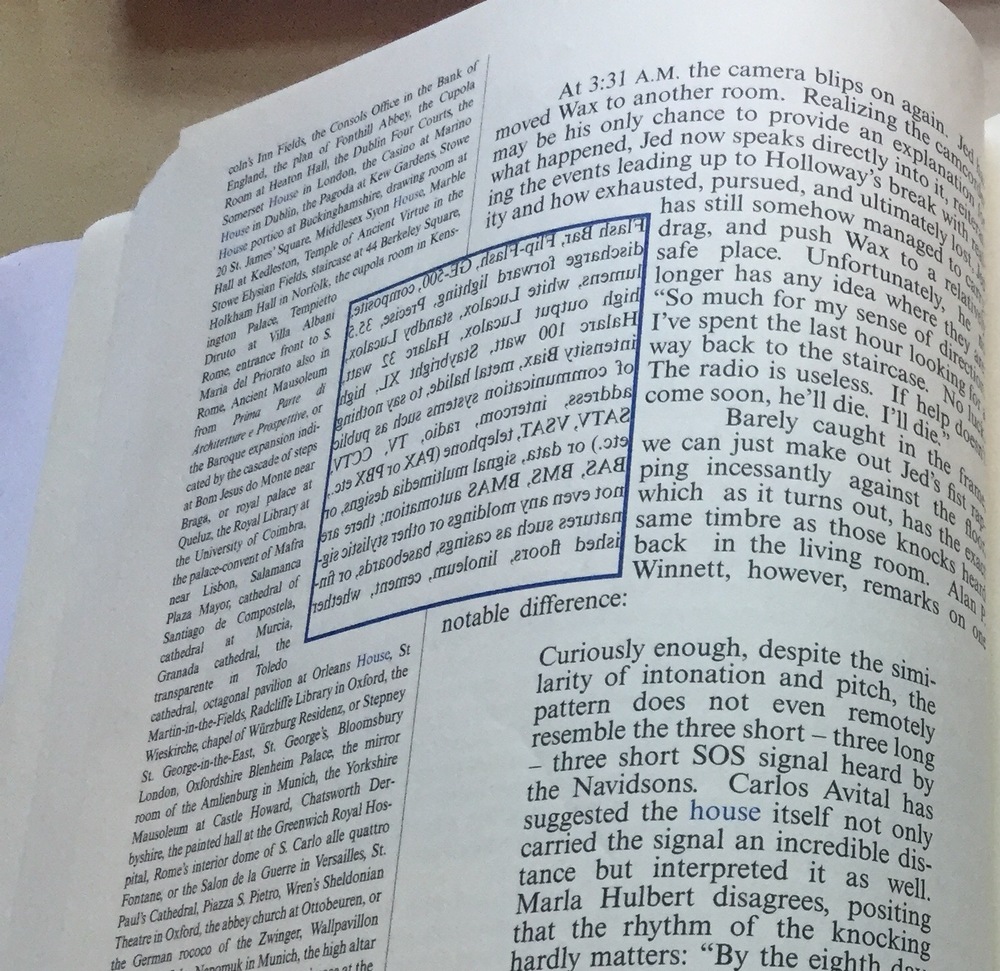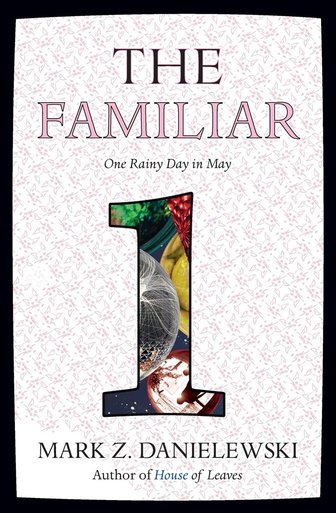by Laura Barker

Egon Shiele/ Bridgeman Art Library/ Universal Images Group
Death couldn’t find any toothpaste. He opened the cabinets above the rust-rimmed sink. All he could find were little plastic packets of floss, his wife’s antidepressants, and the candy-colored bottles of Bubble Fun that his son used to love. Death swept a finger along the metal shelves and frowned at the grime that coated his nail. Their apartment was falling apart, with them still inside.
Death popped his head out the bathroom door, “Honey, do we have any toothpaste?”
Death’s wife, Lisa Mercy, stood at the kitchen sink. She was three pills into her daily nine-pill routine. There were so many different ones, some squat, some oily, some square, some teal. They all came in acid-orange containers, each one promising to be the miracle drug to bring back the sunny-smiled bride Death had married ten years ago. She took two more pills before answering her husband, “In the top drawer.”
Death pulled open the drawer. Nothing but a stick of deodorant and random Lego pieces, “Nope, nothing here. I think we’re out.”
“How can we be out, I just bought like twelve at Costco.” Lisa started towards the bathroom, but stopped herself. She turned back towards the kitchen sink and grabbed her water glass. “Check the lower cabinet,” she called.
Death sighed. Looks like it was going to be a mouthwash day. He closed the mirrored cabinets and blinked at his reflection. People always pictured Death as cloaked in a threadbare black robe with a gleaming white skull and skeletal fingers that beckoned people to their graves. In reality, Death looked much less gaunt. He was a tall, bespectacled man with thinning brown hair and teeth that badly needed braces. He wore college sweatpants and a t-shirt instead of the medieval robe, and carried an iPhone instead of scythe. It was an average phone, with a chipped glass cover, but it had an app to inform him of the latest death. It buzzed, and Death would have to put on real pants and escort the deceased to the Other Side. Not a glamorous job, but it paid the bills.
Death unscrewed the bottle of mouthwash “Oh, before I forget,” he called out the bathroom door, “Guess who I met yesterday?”
Lisa dug her nails into the glass at the sound of his chipper voice.
“Remember that singer you used to really like? Peaches?” Death threaded a waxy string of floss between his fingers, “Yeah, she died yesterday. Man, she did not want to cross. Kept whining and complaining about how she deserved a second chance, and how she didn’t do that much cocaine.” He rolled his eyes, “Divas.”
He listened for her to gasp or give him that little chuckle where he could hear her smiling, but he was greeted with hollow silence. Death went back to flossing. He should be used to it by now. Lisa had been sulking ever since Death carried their son across to the Other Side. For some reason, she blamed it on him. It wasn’t his fault that David fell off the swing set and broke his little neck. Death didn’t force him to pump his legs higher and higher, sending the swing so high that for a second it seemed to defy gravity. Death didn’t tell him to jump off to see if he, too, could hover in the air for that magical moment. The only thing he did was hold his son’s hand as he passed onto the Other Side.
Lisa had begged Death not to let David go. She begged, she bargained, she cried, she even threatened to divorce him. But Death would not compromise his responsibility. He had made no exceptions for his own father or best friend. He’d carried the best man at his wedding over after he was hit by a group of joy-riding teenagers. Sure, it was sad, but it had to be. Mortality was as much of the life cycle as birth was. Death only wished Lisa could see it this way.
Death’s phone buzzed again. With his free hand, he swiped to the home screen, “This might interest you,” he said.
Unbeknownst to Death, Lisa was lying face down on their collapsed couch. She rolled onto her side and saw the little toy duck David used to love that had slipped under the TV cabinet. Shortly after his son’s parting, Death had quietly donated all of David’s toys and clothes to charity, but every now and again, Lisa would find a stray sock under the sofa, or Goodnight Moon wedged under their bed. When she found them, she started towards her son’s room, and then when she remembered, a horrible sound would catch in her throat, and she’d lock herself in the bathroom with a bottle of vodka and a trembling handful of aspirin until Death came home.
Death laced floss between his fingers, “Oh, and guess who was my last delivery of the day? Mrs. Doris!” Death chuckled, “Oh, Mrs. Doris. Such a trouper. She didn’t complain the whole way down there. She even said–you’ll love this–she said ‘That damn head ache’s finally gone!’”
Lisa remained on the couch, eyes fixed on the toy duck under the couch. She rolled her sixth pill between her fingers. Lisa had been to a slew of psychopharmacologists, who also listened to her worn story and prescribed a rainbow of pills: Zoloft, Celexa, Sarafem, Xanax, Prozac. The drugs made her brain feel hollow and numbed the ache in the center of her chest, but nothing could get rid of the pain of being too busy on the phone to take a good last look at her David’s sweet gap-toothed grin as she sent him to his last day of school.
The phone perched on the edge of the sink buzzed. “Huh. Danielle Brooks. Isn’t she the nice little sixteen-year old from down the street?”
Silence.
Death shrugged, “Hope it wasn’t anything too bad. She was a sweet kid.” He pulled back his lips to check his teeth, “Looks like we need to book a new cat sitter pronto.”
Lisa covered her face with her hands. She couldn’t stand the way that Death talked about it. Like dying was nothing more than a spilled glass of apple juice. It didn’t bother her when she was young, and the only people dying were friends’ grandpas and aging rock stars. But as she grew older, the people who were dying became closer and closer to her. First it was her college roommate, who died in a plane crash. Then her best friend from high school, when cancer came roaring back to fight a third time and won. Then her sister, who was crushed under the wheel of a truck after she pushed her son to safety.
The deaths kept growing, a horrible weight building between Lisa’s shoulders. She’d beg Death to overlook one death, and even held onto his legs to prevent him from collecting her father. But years of screaming, pleading, and threatening didn’t even put a dent in Death’s dedication to his job. Then David’s death came. What killed Lisa was that Death didn’t even let her have a few seconds for a goodbye, a final hair smoothing, a few words of love that he could carry with him into eternity. No, he just helped his son off the ground and delivered him before picking up the phone. That destroyed her.
Death peeked his head out of the bathroom door, “Hon? You okay?”
Pretending not to hear him, Lisa stood up and walked back over to the stove. She stirred the eggs half-heartedly.
“Well, T.G.I. Wednesday, am I right?” he laughed to himself. Lisa didn’t even move, “Hey, know what’s getting me through this week? Our date this Friday.” He ran a hand through his thinning hair as he walked out of the bathroom, “You know, we haven’t gone out in forever. But this Friday is gonna be great. A fireside table in the Oak + Fig, a piano concert downtown, maybe a few cocktails afterwards….” He walked up behind her and wrapped his arms around her waist. Lisa startled so suddenly that Death drew back, “Hey, take it easy, tiger. You act like you’ve just seen the Grim Reaper!” The joke was almost as old as he was, but it never failed to bring a smile to Lisa’s lips. But with her back turned to him, Death couldn’t be certain.
Death started back towards the bathroom, but stopped just before turning the corner. “Hey,” he said quietly.
Lisa turned around. Her eyes were glassy. Her face still looked young, but was creased around the eyes from years of crying.
“Just wanted to say you look beautiful today.”
Lisa smiled, but her eyes looked even glassier. She turned back to the eggs. “Scrambled?”
“That’d be perfect. Thanks, hon.” Spirits lifted, he went back to flossing. He always knew just the right thing to cheer his wife up.
Once her husband left, Lisa opened the sliding door to the balcony. She took a step outside, the cool cement chilling her bare feet. Her bathrobe caught in the late September wind and billowed around her. Lisa took another cautious step forward. She gripped the metal bar and looked over the edge. The city was spread below her like a child’s drawing. The tiny cars looked like beetles scurrying along thin strips of grey, and the trees looked like drops of lime candy. The playground just below them was empty, making all the army-green play equipment look lonely in the middle of the urban jungle. It was too much like the little worlds she’d make with David in their playroom out of Tinkertoys and Legos. She could still see his small hands interlocking the wooden toys together, carefully outlining a world that would be destroyed seconds later.
Lisa clutched her bathrobe closer to her, closing the gap between her breast and her robe. The smell of exhaust made her head feel light. Wordlessly, she lifted herself over the balcony’s railing and rested her feet between the metal bars. Her stomach pitched as the wind gently pushed her forwards and backwards over forty stories of nothingness. The wind howled in her ears and blew her untidy strawberry blonde curls around her like she was underwater. She leaned forward, fingers still hooked under the railing, and looked down. Her grip loosened.
Death’s phone buzzed.
0
0
1
50
289
WPI
2
1
338
14.0
Normal
0
false
false
false
EN-US
JA
X-NONE
/* Style Definitions */
table.MsoNormalTable
{mso-style-name:”Table Normal”;
mso-tstyle-rowband-size:0;
mso-tstyle-colband-size:0;
mso-style-noshow:yes;
mso-style-priority:99;
mso-style-parent:””;
mso-padding-alt:0in 5.4pt 0in 5.4pt;
mso-para-margin:0in;
mso-para-margin-bottom:.0001pt;
mso-pagination:widow-orphan;
font-size:12.0pt;
font-family:Cambria;
mso-ascii-font-family:Cambria;
mso-ascii-theme-font:minor-latin;
mso-hansi-font-family:Cambria;
mso-hansi-theme-font:minor-latin;}
Laura Barker was born in Chicago and is a junior at Clark University, pursuing an English Major with a concentration in Journalism and Creative Writing. She enjoys reading, is working on a novel (The Brycean Files), and is active in musical theatre and student government.











